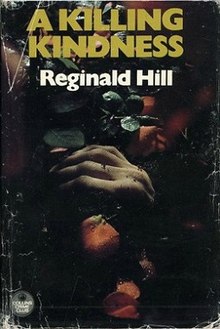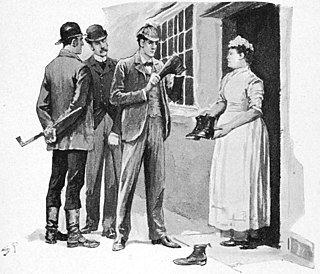
Detective fiction is a subgenre of crime fiction and mystery fiction in which an investigator or a detective—either professional, amateur or retired—investigates a crime, often murder. The detective genre began around the same time as speculative fiction and other genre fiction in the mid-nineteenth century and has remained extremely popular, particularly in novels. Some of the most famous heroes of detective fiction include C. Auguste Dupin, Sherlock Holmes, and Hercule Poirot. Juvenile stories featuring The Hardy Boys, Nancy Drew, and The Boxcar Children have also remained in print for several decades.

Crime fiction, detective story, murder mystery, mystery novel, and police novel are terms used to describe narratives that centre on criminal acts and especially on the investigation, either by an amateur or a professional detective, of a serious crime, generally a murder. It is usually distinguished from mainstream fiction and other genres such as historical fiction or science fiction, but the boundaries are indistinct. Crime fiction has multiple subgenres, including detective fiction, courtroom drama, hard-boiled fiction, and legal thrillers. Most crime drama focuses on crime investigation and does not feature the courtroom. Suspense and mystery are key elements that are nearly ubiquitous to the genre.

Crime and Punishment is a novel by the Russian author Fyodor Dostoevsky. It was first published in the literary journal The Russian Messenger in twelve monthly installments during 1866. It was later published in a single volume. It is the second of Dostoevsky's full-length novels following his return from ten years of exile in Siberia. Crime and Punishment is considered the first great novel of his mature period of writing. The novel is often cited as one of the supreme achievements in world literature.

Patricia Cornwell is an American crime writer. She is known for her best-selling novels featuring medical examiner Kay Scarpetta, of which the first was inspired by a series of sensational murders in Richmond, Virginia, where most of the stories are set. The plots are notable for their emphasis on forensic science, which has influenced later TV treatments of police work. Cornwell has also initiated new research into the Jack the Ripper killings, incriminating the popular British artist Walter Sickert. Her books have sold more than 100 million copies.

Mystery is a fiction genre where the nature of an event, usually a murder or other crime, remains mysterious until the end of the story. Often within a closed circle of suspects, each suspect is usually provided with a credible motive and a reasonable opportunity for committing the crime. The central character is often a detective, who eventually solves the mystery by logical deduction from facts presented to the reader. Some mystery books are non-fiction. Mystery fiction can be detective stories in which the emphasis is on the puzzle or suspense element and its logical solution such as a whodunit. Mystery fiction can be contrasted with hardboiled detective stories, which focus on action and gritty realism.
Jonathan Seth Kellerman is an American novelist, psychologist, and Edgar- and Anthony Award–winning author best known for his popular mystery novels featuring the character Alex Delaware, a child psychologist who consults for the Los Angeles Police Department.
Reginald Charles Hill FRSL was an English crime writer and the winner in 1995 of the Crime Writers' Association Cartier Diamond Dagger for Lifetime Achievement.
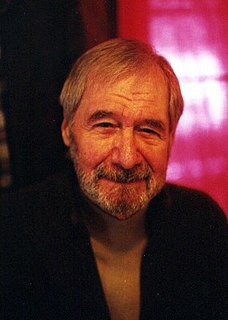
Evan Hunter was an American author and screenwriter who also wrote under a number of pen names, most notably Ed McBain, used for most of his crime fiction. Born Salvatore Albert Lombino, he legally adopted the name Evan Hunter in 1952; he also used the pen names John Abbott, Curt Cannon, Hunt Collins, Ezra Hannon, and Richard Marsten, among others. His 87th Precinct novels have become staples of the police procedural genre.

The Edgar Allan Poe Awards, popularly called the Edgars, are presented every year by the Mystery Writers of America, based in New York City. Named after American writer Edgar Allan Poe (1809–1849), a pioneer in the genre, the awards honor the best in mystery fiction, non-fiction, television, film, and theater published or produced in the previous year.

Elmore John Leonard Jr. was an American novelist, short story writer, and screenwriter. His earliest novels, published in the 1950s, were Westerns, but he went on to specialize in crime fiction and suspense thrillers, many of which have been adapted into motion pictures.
The police procedural, or police crime drama, is a subgenre of procedural drama and detective fiction that emphasizes the investigative procedure of a police officer or department as the protagonist(s), as contrasted with other genres that focus on either a private detective, an amateur investigator or the characters who are the targets of investigations. While many police procedurals conceal the criminal's identity until the crime is solved in the narrative climax, others reveal the perpetrator's identity to the audience early in the narrative, making it an inverted detective story. Whatever the plot style, the defining element of a police procedural is the attempt to accurately depict the profession of law enforcement, including such police-related topics as forensic science, autopsies, gathering evidence, search warrants, interrogation and adherence to legal restrictions and procedure.
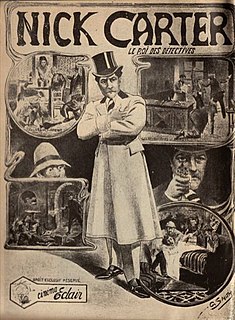
A mystery film is a genre of film that revolves around the solution of a problem or a crime. It focuses on the efforts of the detective, private investigator or amateur sleuth to solve the mysterious circumstances of an issue by means of clues, investigation, and clever deduction.
Neo-noir is a revival of film noir, a genre that had originally flourished during the post-World War II era in the United States—roughly from 1945 to 1960. The French term, film noir, translates literally to English as "black movie" or "dark movie", indicating sinister stories often presented in a shadowy cinematographic style. Neo-noir has a similar style but with updated themes, content, style, and visual elements.
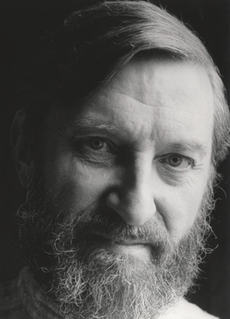
Henry Reymond Fitzwalter Keating was an English crime fiction writer most notable for his series of novels featuring Inspector Ghote of the Bombay CID.

The Colorado Kid is a mystery novel by American writer Stephen King, published by the Hard Case Crime imprint in 2005. The book was initially issued in one paperback-only edition by the specialty crime and mystery publishing house. King's next novel for Hard Case Crime was Joyland, which was published in June 2013. Hard Case Crime reissued The Colorado Kid in an illustrated paperback edition in May 2019.
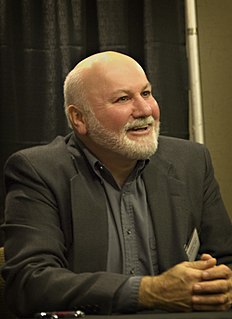
Loren D. Estleman is an American writer of detective and Western fiction. He is known for a series of crime novels featuring the investigator Amos Walker.

Kjartan Fløgstad is a Norwegian author. Fløgstad was born in the industrial city of Sauda in Ryfylke, Rogaland. He studied literature and linguistics at the University of Bergen. Subsequently, he worked for a period as an industrial worker and as a sailor before he debuted as a poet with his collection of poems titled Valfart (Pilgrimage) in 1968. He received the Nordic Council's Literature Prize for his 1977 novel Dalen Portland. Other major works include Fyr og flamme, Kron og mynt, Grand Manila and Grense Jakobselv.
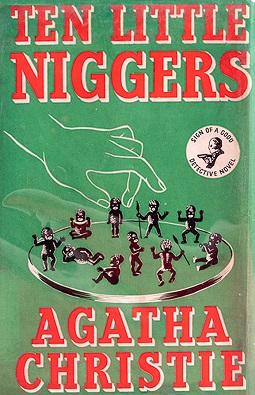
And Then There Were None is a mystery novel by the English writer Agatha Christie, described by her as the most difficult of her books to write. It was first published in the United Kingdom by the Collins Crime Club on 6 November 1939, as Ten Little Niggers, after the children's counting rhyme and minstrel song, which serves as a major plot element. The US edition was released in January 1940 with the title And Then There Were None, taken from the last five words of the song. Successive American reprints and adaptations use that title, though Pocket Books paperbacks used the title Ten Little Indians between 1964 and 1986. UK editions continued to use the original title until 1985.

Agatha Christie (1890–1976) was an English crime novelist, short-story writer and playwright. Her reputation rests on 66 detective novels and 15 short-story collections that have sold over two billion copies, an amount surpassed only by the Bible and the works of William Shakespeare. Her works contain several regular characters with whom the public became familiar, including Hercule Poirot, Miss Marple, Tommy and Tuppence Beresford, Parker Pyne and Harley Quin. Christie wrote more Poirot stories than any of the others, even though she thought the character to be "rather insufferable". Following the publication of the 1975 novel Curtain, Poirot's obituary appeared on the front page of The New York Times.
